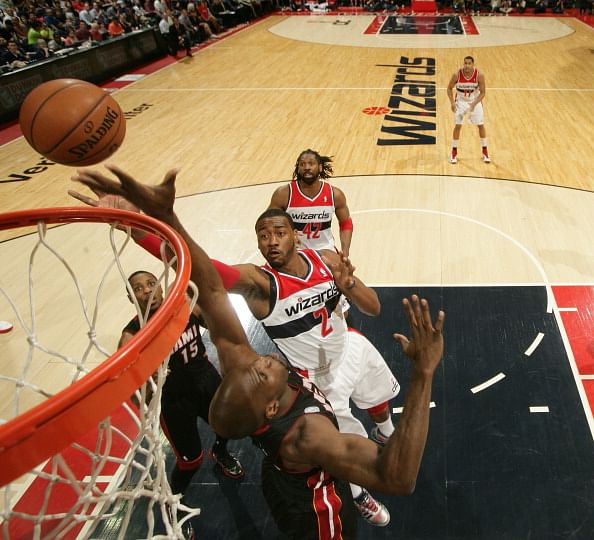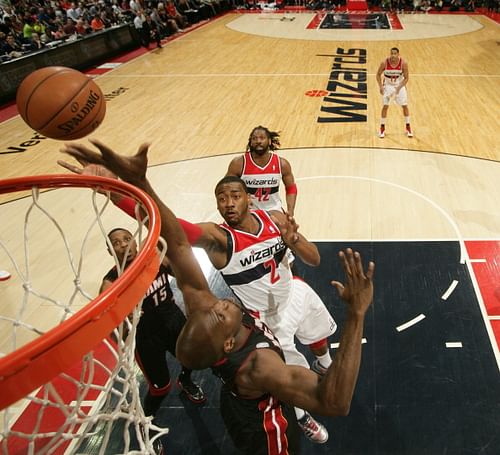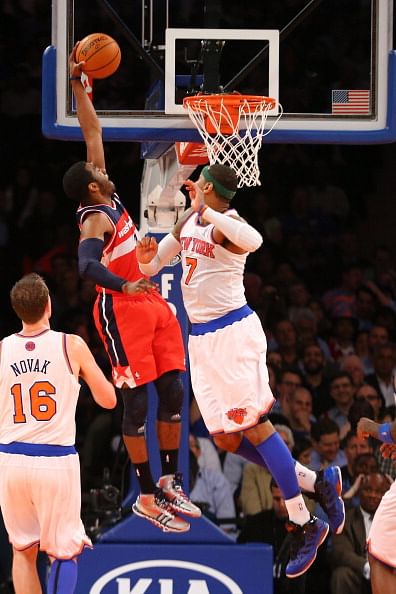
Can’t break down this Wall

January 7th. The Washington Wizards got one of their biggest wins of the season, a surprise triumph against the West’s best, Oklahoma City Thunder. They celebrated, as they should have. It ‘improved’ the worst team in the NBA from 4-28 to 5-28. This was a team that had started the season with 12 consecutive defeats. Rookie Bradley Beal had shown some promise, Trevor Ariza and Nene had been bright-ish sparks, but this was a team going nowhere fast.
And then John Wall returned.
Picked first by the Wizards in 2010 after a banner year for Kentucky, Wall’s career had been relatively underwhelming the first couple of years. Underwhelming, when seen in perspective of the high standards that his previous performances and his athletic capacity set up for himself. Blessed with blistering speed on and off the ball and tremendous athleticism, Wall entered the league as one of the poster-boys of basketball’s new generation point guards. Players like him, Derrick Rose and Russell Westbrook were fast, strong, and unstoppable, and they were here to revolutionize the point guard position.
Only, things didn’t quite pan out as they should have. Wall, of course, didn’t completely disappoint. He became the third youngest player to have a triple double in his rookie season. He was named as part of the 2011 ‘Rising Stars’ Challenge. He finished second in Rookie of the Year voting, behind Blake Griffin.
Players with great potential make their biggest jump in their sophomore season. And that’s what Wall couldn’t do. Although he played and started in every game in his second season for the Wizards, Wall’s production stagnated across the board. The Wizards finished second-worst in the league and people started to wonder if he could ever figure out a way to improve his jump-shot. The pressure to perform and ‘break-out’ increased manifold on the young man’s shoulders when he got injured at the start of the current season and saw his team lose 23 of their first 28 games.
Luckily for Washington and Wall fans, that ‘break-out’ finally is finally here.
 Since his return to the Wizards’ lineup on January 12, Wall has been averaging a career high 18.4 points per game and shooting at a career-best 44.7% from the field goal. Since his return, the Wizards have enjoyed a 24-23 record, which would’ve been good enough for a playoff spot in the East if Wall had them running at the same pace all season. The playoffs seemed out of reach months ago, but in Wall’s return and this team’s return to relevance, there is now finally some optimism in the future of Washington basketball.
Since his return to the Wizards’ lineup on January 12, Wall has been averaging a career high 18.4 points per game and shooting at a career-best 44.7% from the field goal. Since his return, the Wizards have enjoyed a 24-23 record, which would’ve been good enough for a playoff spot in the East if Wall had them running at the same pace all season. The playoffs seemed out of reach months ago, but in Wall’s return and this team’s return to relevance, there is now finally some optimism in the future of Washington basketball.
Wall’s play has finally begun to respond to the expectations from his game as the number one pick. He scored 24 points and passed out 16 assists (with just 1 turnover) in a memorable comeback win over the Lakers in LA. He had 27 points, 9 assists, 8 rebounds, and 3 blocks in a win over the defensive-minded Bulls. He saved his two finest performances against the two best defenses in the league, going for 37 points in a win over the Pacers and a career-high 47 points (on 13-22 shooting, along with 8 assists and 7 rebounds) in a win over the Grizzlies.
His outburst has been so magnificent that it has had people wondering how different this season could’ve panned out for the Wizards – and for opposing teams in the East – had he played all season. No matter, for even though they ‘lost’ the 2012-13 season, things look better than ever for 2013-14. Wall is still only 22 (!) and primed for his first All Star caliber season. Bradley Beal has the potential to become one of the best shooters in the league over the next few years. Trevor Ariza, Martell Webster, Nene and Emeka Okafor make for a decent surrounding core.
If they carry on the form that they caught early in the calendar year into next season, they could definitely make the Eastern Conference playoffs for the first time since 2008.
And the man in the middle is Wall, who – in his third season – has finally taken the leap to become a consistent star in the league.